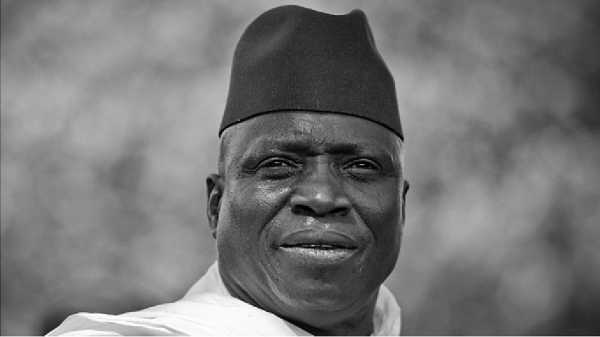 (JollofNews)- If you have not read any of professor Chinua Achebe’s books, please get a copy of this small but heavily loaded book entitled “The Trouble with Nigeria”.
(JollofNews)- If you have not read any of professor Chinua Achebe’s books, please get a copy of this small but heavily loaded book entitled “The Trouble with Nigeria”.
In his book Chinua Achebe (1930-2013) declared that “the trouble with Nigeria is simply and squarely a failure of leadership. There is nothing basically wrong with the Nigerian character. There is nothing wrong with the Nigerian land or climate or water or air or anything else.
The Nigerian problem is the unwillingness or inability of its leaders to rise to the responsibility, to the challenge of personal example which are the hallmarks of true leadership.”
Achebe’s testament of bad leadership by successive Nigerian leaders remains timeless in the scale and scope of its vindication from independence to date. Looking around Nigeria, nothing but colossal failure is evident.
From local government councilors all the way to the presidency, the only business of government is the monumental and frenzied looting of the nation’s coffers, while the huddled masses reek in unbelievable poverty and destitution.
Nigeria is “a nation for sale,” high jacked since independence by thieves, bigots, mass murderers, war criminals, unpatriotic opportunists, election riggers and other such vermin who have run the nation through an unnecessary civil war, corruption and total despoliation.
Nigeria is consequently a failed state, plagued by social injustice, unrest, debilitating poverty, disharmony and ethno-religious turbulence.
A score card of the nation’s sadistic leaders since independence as listed below underscores the timeless veracity of Achebe’s apocalyptic testament of a nation poisoned since its founding by bad leadership
















The trouble with Nigeria is the people. I have had the opportunity to do research with many Africans, many of them Nigerians. I have spent time in Ibadan at the prestigious University of Ibadan, at the University of Lagos, in Nsukka at the University of Nigeria there and at Ahmadu Bello in Zaria. I have lots of friends in the largest Nigeria community in Gambia. In fact the largest market in Gambia is dominated by Nigerians. I have read Achebe’s book you cited and his classic ‘Things Fall Apart” beyond that I met the man himself before he died. That country Nigeria, is home to 200 million of the sharpest minds in Africa. Lagos remains home to some of the wealthiest men and women in Africa. The average Nigerian is an opportunist that fully supports the status quo and actively and passively participates and enables corruption at all levels of that society with the goal of patiently awaiting his or her own opportunity to carve out a piece of the pie. The erudite laureate Wole Soyinka has laid the blame of corruption at the doorstep of “every man and woman on that soil ” It is a myth to blame the failure and lost opportunity of what would have been the greatest African democracy at the feet of its leaders solely. Nigerians – The People as a whole destroyed their own legacy and history.
I thank Mr. Jallow for a thoughtful piece. However, I would argue that the article’s conclusion is by no means at odds with Dr. Sarr’s conclusions as to the root causes of the Giant of Africa’s endemic crisis. Rather, I’d argue that they are two sides of the same coin: the man in the streets´ passivity in the face of the daylight mass-robbery of Nigeria’s resources could easily be attributed to leadership failure of one kind or the other. Leaders can easily be compared to parents in this regard: the latter’s kids do not do what mum and dad say they should do. Instead, they do what mum and dad do.
A case in point is an African country that was amongst the most corrupt on the continent some twenty three years ago, namely Rwanda. However, due inter alias to leadership by example and tough laws that are mercilessly enforced on a routine basis, the country is today one of the three least corrupt countries on our beautiful continent.
Nigeria’s current federal leaders are well aware of the role played by leadership-by-example in this regard, and both the current president and his deputy have said time and again that: Nigeria as a state must kill corruption in the country otherwise corruption shall kill the federal republic. They have since been backing the claim up by concrete actions on the ground – both legislative and executive – and with positive results hitherto. Meanwhile, let us wish them well in this noble endeavour.
We as Gambians must learn a lesson or two from the Nigerian experience in this regard. Not least when it comes to passivity by members of the general public in the face of cynical corrupt practices on a huge scale. The fact that everyone is committing a vice does not per se give an individual an excuse to do the same thing. NO, far from it! Unfortunately, this line of reasoning is still widespread in Gambian society, and therein lies the reason why Jammeh was able to cling to power for over two decades. Most of the populace supported him initially largely because everyone else in the neighbourhood did so. The few of us who dared stand by our principles were by all indications the mavericks of his time.
Paradoxically, history has proven the latter right.
Sir, our cousins in Nigeria are a different animal. They do not see their leaders in that way. They regard the political elites and leaders as those fortunate enough to be in the enviable position to commit mass looting, they cheer them on, they sing their praise as if they are prized fighters. They worship the crooks and they pray quietly for their own opportunity to raid. The entire society is corrupt beyond repair. Even if you change the leaders, their new crop of young leaders are sure to be worse than those there now. The Psyche of Nigeria is beyond redemption when it comes to stealing. Truly the world over Nigerians have a monopoly on corruption and financial crimes. I am sorry to say. Alagi is politically correct and makes a great point. Rightly so, he does not paint the entire population as I have done. I have no such restraint. I have said so to their leader’s face, and their is concordance even in their ranks in this case.
Perhaps my optimism in this regard could be attributed to my innately optimistic nature. Not least, when it comes to the potential of humankind to improve upon itself both as individuals and members of a community, irrespective of cultural differences. However, I do understand the basis of your pessimism in this regard in light of personal experiences at close range. Perhaps all this is the result of Britain’s rash decision to amalgamate three hitherto independent territories a little over a century ago, on the eve of independence: Each was thereby forced into a marriage relationship with a foreign spouse which was not of its own choice in the first place. Arguably a useful historical lesson for the whole of Africa.
Having said that however I think there is still room for optimism in this regard, having regard to the current federal political leadership’s admission of a sense of national shame whenever they read the persistently bad statistics about their country in this regard – not only in Africa but globally – every now and then in the mass media. Let us hope this unattractive record turns out to be the real driver behind their current anti-corruption endeavours – i.e. the stigma must be fought tooth and nail in order to save the national honour.